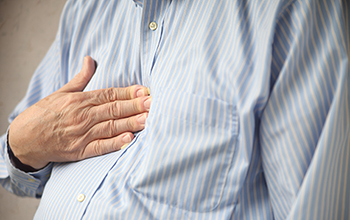
We’ve all felt it at some time, maybe after a particularly hearty meal, a hard workout or after that last delicious cocktail on a night out — an insistent, burning sensation in the chest commonly called “heartburn.”
It may be mild and pass quickly, or it can stop us in our tracks, clutching our midsections and reaching for medicinal relief. So, what exactly is heartburn? We spoke with Bryan Sauer, MD, a physician with UVA’s gastroenterology team, to get some insight.
Oh, How It Burns
“Heartburn is really a symptom of gastroesophageal reflux, where you have gastric contents moving up into the esophagus,” says Sauer. These gastric contents, which include stomach acid (from normal digestion), partially digested food and bile, irritate the esophagus (the tube that leads from your mouth down to your stomach).
Your stomach produces a thick layer of mucus that protects it from the acid it produces. “The stomach is designed to have acid in it. The esophagus is not meant to,” states Sauer. Since the esophagus lacks that same protective layer, we feel the stomach acid irritating and burning the lining of the esophagus when it comes up.
Where the esophagus meets the stomach, there’s a group of muscles called the lower esophageal sphincter (LES). The LES keeps the contents of the stomach from traveling back up. Sometimes, this muscle relaxes or becomes less efficient at preventing regurgitation (because of other conditions).
“Because the LES has to open so that food can go down or we can burp, oftentimes, a little gastric contents and acid come up into the esophagus. And that’s normal,” says Sauer.
Where There’s Smoke There’s Fire
Often, what we eat can trigger heartburn. Although heartburn triggers are different for everyone, some common foods that can cause it include:
- Fried foods
- Food with tomatoes or tomato sauce
- Chocolate
Alcohol and caffeinated drinks may also bring on the burn. Certain medical conditions and medications can also cause it. Our lifestyle habits may also lead to heartburn; for instance, smoking is a potential cause, and exercise may trigger it as well.
“Both alcohol and tobacco can relax that LES, and when it relaxes, it opens. When it’s open, that’s when it’s more likely that the contents will go up the esophagus,” Sauer explains.
The pain caused by heartburn may be worse if you are lying down (especially right after a workout), as the liquid contents of the stomach won’t have to fight gravity like they do when you are standing. Also, pregnancy can worsen instances of heartburn, because the growing fetus takes up space within the body and pushes up against the stomach. Obesity is the most common risk factor for heartburn, as the extra weight in the midsection puts pressure on the stomach, leading the reflux.
From Pet Peeve to Problem
Many people experience heartburn, some even regularly (a 2010 study states that about 42 percent of the US population has experienced it at some point). But, as Sauer pointed out, although experiencing intermittent heartburn is common and normal, it can also be a symptom of a more serious condition called gastroesophageal reflux disease (also called GERD).
GERD, a chronic condition in which the stomach contents frequently reflux up the esophagus, may cause heartburn, acid reflux into the mouth, vomiting and breathing problems. Over time, GERD can lead to esophagitis (inflammation of the esophagus), esophageal strictures (narrowing or tightening of the esophagus) and other conditions.
An estimated 17 million Americans suffer from GERD. The triggers and symptoms are very similar to those for run-of-the-mill heartburn, but it can become more serious over time. So, when should you be concerned that your heartburn may actually be something more?
When Should You Speak With a Doctor?
“I think the right answer to that question is when it is affecting or altering someone’s life or lifestyle,” says Sauer. “When it’s happening every day, or is worse at night, or you can’t eat any of the foods you want to, then it’s a reason to go see somebody about this. When you’re going to see your primary care doctor, like we should do every year for an annual exam, it’s good to explain to him or her what kind of symptoms you’re having and how often they are.”
“If it’s once every couple of months, you’ll probably just take a couple of antacids. But if it gets more concerning, then you should,” he adds.
Because heartburn can be a sign of heart disease, consult your doctor if you’re experiencing the following symptoms regularly:
- Heartburn
- Frequent or lasting indigestion, including pain in the belly, bloating, gassiness and nausea
- Reflux of stomach contents into the back of the mouth or throat
- Sour or bitter taste in the back of mouth or throat
- Symptoms worsen when exercising, lying down or bending over
Dousing That Heartburn
Luckily, controlling heartburn and GERD doesn’t have to involve drastic measures, although it can be a challenge. “We often start by talking about lifestyle and diet modifications. The most important thing for many folks is losing some weight, especially if folks are overweight,” advises Sauer, “because the extra weight is on your belly, usually, and can push some of that stuff into the esophagus.”
“The other thing I tell folks is to put the head of their bed up at nighttime, the whole headboard up and at a bit of an incline, particularly if they have more symptoms when lying down. When we’re standing up, we have gravity on our side. But, when we’re lying flat to go to bed, we no longer have that.
“I don’t universally recommend some of the diet modifications, such as avoiding coffee, chocolate, fatty foods or carbonated beverages. I found most folks don’t actually want to do that and it has a huge effect on their quality of life. Certainly, if someone has symptoms with just one of those, I’d ask them to consider stopping it.”
Experiencing Frequent Heartburn?
Concerned that it may be something more? See your primary care provider to answer your questions.
“Weight loss, I think, is huge. A lot of people improve with weight loss. And, it’s better for your overall health,” Sauer says.
When lifestyle modifications aren’t enough to turn the dial down on the heat, there are medications that can help.
“If folks are having it very intermittently, say once a week or less, then antacids or H2 blockers are really effective on an as-needed basis. For folks that have it more often than that, we typically use a proton-pump inhibitor to take daily. And that’s pretty effective in about 99 percent of people, if it is acid,” says Sauer.


Ever since I stopped the rinidien about 3 weeks ago the diarrhea was stopped. But the heart burn has increased tremendlessly. Have taken this for about 10 years and now I can’t sleep at all. I have to sleep when I can sitting up. Otherwise I have all this coming back up ln my throat.
Zantac worked for me. Pelvic and Tagament do nothing. Prilocec gives me diarrhea. I’m really suffering without it. Put it back on the store shelf with a big warning on packaging.